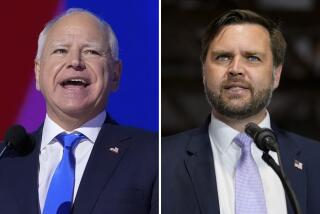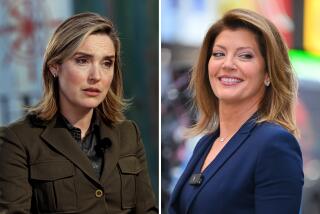Opinion: Why non-journalists often ask better questions at a presidential debate than journalists
At Sunday’s presidential debate rematch between Donald Trump and Hillary Clinton, to be held at Washington University in St. Louis (“The Dispiriting of St. Louis”), half the questions will be asked by purportedly uncommitted voters picked by the Gallup Organization. The other half will be asked by the two moderators, CNN’s Anderson Cooper and ABC’s Martha Raddatz.
I like this “town meeting” format because non-journalists have, over the years, come up with better and less predictable questions than the folks in my profession who’ve served as moderators. A great example came in 2007, when a debate among Democratic presidential wannabes included a number of questions submitted by the public via YouTube.
One reason is that journalists aren’t supposed to ask about things they have a personal stake in (e.g., “Mr. Trump, what would your chairman of the Federal Communications Commission do about media ownership restrictions?”), so they focus instead on Tough Questions — you know, the kind that highlight a candidate’s departures from the political orthodoxy, controversial statements, apparent hypocrisies or magical beliefs. These tend to be soulless inquiries, and candidates routinely switch the subject onto friendlier territory.
Members of the public, however, ask things they do have a personal stake in. Their questions tend to be heartfelt, riding an emotional undercurrent of outrage, hope or anxiety. They also often are built upon personal stories — a brother with an opioid addiction, a child deployed overseas, a small business that’s challenged.
Granted, sometimes the supposedly independent voters in the audience are partisans or activists with an ax to grind. A bigger problem with the format, though, is that the folks lucky enough to pose a question have to stand there mutely while the candidates deftly shift to a completely different topic or give maddeningly incomplete answers. (Pro tip to those in the debate audience: Go with the two-part question. Ignoring two questions is harder to do, and so the usual evasion is more obvious — and odious.)
Their questions tend to be heartfelt, riding an emotional undercurrent of outrage, hope or anxiety.
Cooper and Raddatz can help on the follow-up front, steering the candidates back to the actual questions they’ve tried to bob and weave around. That’s something Cooper did well in the primary debates this cycle.
You may wonder, as do I, how anyone engaged enough in politics to attend a presidential debate could still be uncommitted. That suggests the room will be filled with people who either find both candidates noxious or who don’t know the first thing about civics. (Or people who are adept at lying to Gallup.)
Regardless, the debate format offers a potential break from the gotcha questions that folks in my profession love, at least for half of the session. It also will provide a window into the experiences of the handful of Americans who’ll get a turn at the microphone. We’ll see whether the candidates actually listen to the stories these people tell, and if they can respond with more than just a message their campaign has prepared them to deliver.
Not that spontaneity has ever been a problem for Trump. Instead, his problem has been giving answers so vague and promises so broad, they’re little more than platitudes. For her part, Clinton has been praised for her willingness to listen to and learn from people on both sides of the partisan divide. Yet her ability to crank out a detailed policy response to every issue thrown her way makes her seem robotic and canned.
Done right, a debate like the one on Sunday will spotlight those weaknesses and challenge candidates to provide better answers — more concrete in Trump’s case, more in-the-moment in Clinton’s. The people asking the questions are less likely to disappoint me than the ones answering them.
Twitter: @jcahealey
MORE FROM OPINION:
Hollywood’s dangerous obsession with China
Why Hillary Clinton should talk about her husband’s infidelity
Ten questions, and answers, about the electoral college
More to Read
A cure for the common opinion
Get thought-provoking perspectives with our weekly newsletter.
You may occasionally receive promotional content from the Los Angeles Times.











